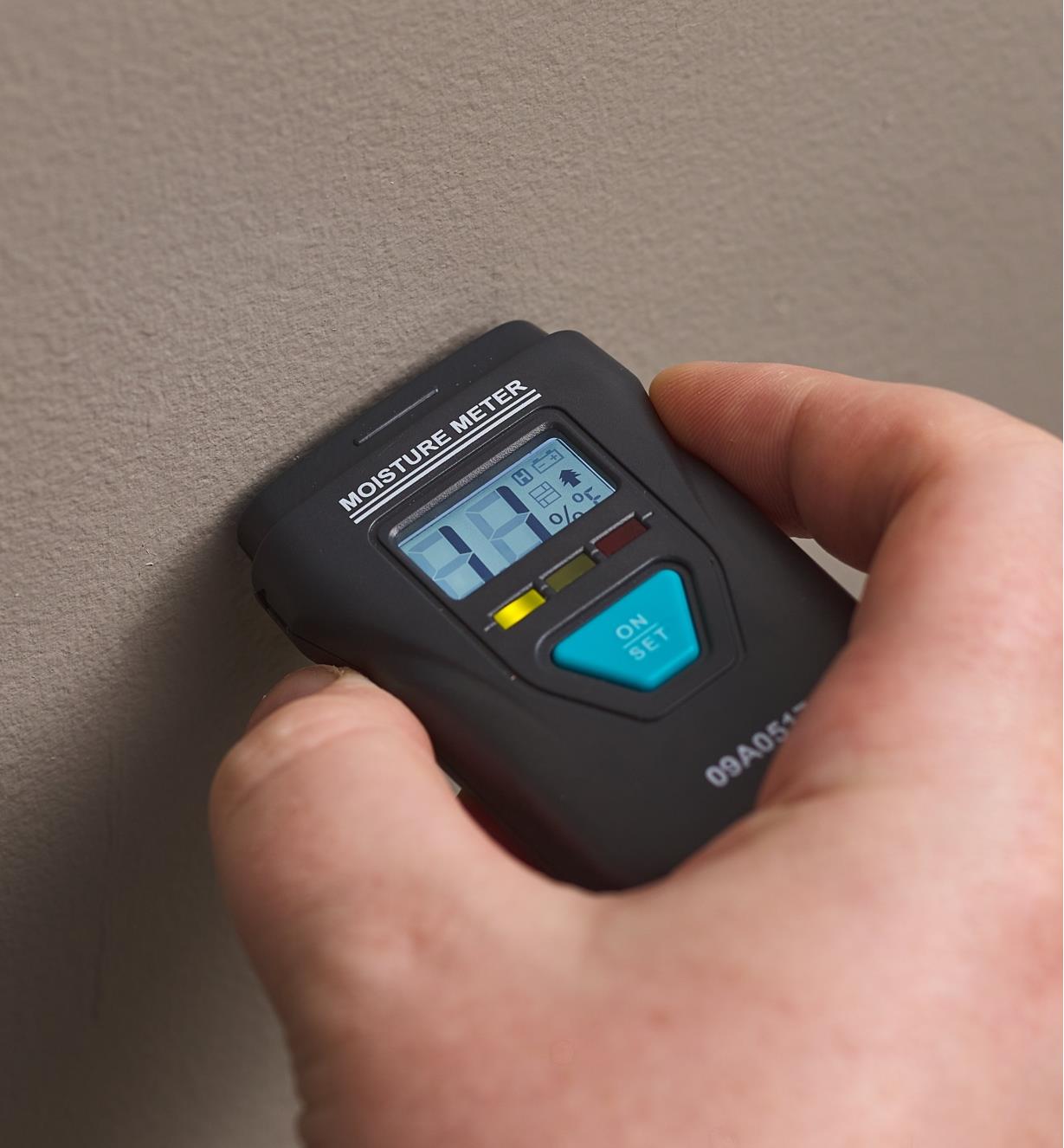Why Every House Owner Needs a Moisture Meter: Trick Advantages and Attributes
Why Every House Owner Needs a Moisture Meter: Trick Advantages and Attributes
Blog Article
The Ultimate Overview to Moisture Meters: A Comprehensive Overview and Just How They Can Save You Money
Dampness meters serve as vital tools in finding and keeping track of moisture web content in materials, helping in protecting against expensive damages and making sure the quality of products. Comprehending the subtleties of various types of wetness meters, their applications, and the possible cost-saving advantages they offer can be a game-changer for services and specialists alike.
Types of Dampness Meters
One typical type is the pin-type wetness meter, which measures the electrical resistance between two pins placed into a material. Pinless moisture meters, on the other hand, usage electro-magnetic sensing unit plates to check a bigger area without causing damage to the material's surface area.

Infrared wetness meters determine the thermal properties of a product to identify its dampness content non-invasively, making them useful for applications where pin or pinless meters might not be appropriate. Comprehending the various types of wetness meters readily available can help markets pick the most appropriate tool for their details moisture measurement requirements.

Benefits of Utilizing Moisture Meters
Moisture meters use invaluable advantages in properly assessing and monitoring dampness levels in diverse materials and environments (Moisture Meter). One of the main advantages of making use of moisture meters is the prevention of prospective damages brought on by excess dampness. By spotting and dealing with high wetness degrees beforehand, moisture meters help to stop mold and mildew development, rot, and architectural damages in structures, conserving both money and time on repairs. Additionally, moisture meters aid in guaranteeing the high quality of materials during building or manufacturing processes. By precisely determining wetness material, these devices aid keep the honesty of timber, drywall, concrete, and various other products, lowering the threat of issues or failings.
Moreover, utilizing moisture meters can lead to increased power effectiveness. By determining areas with high dampness degrees, such as leakages or poor insulation, adjustments can be made to improve power preservation and reduce utility prices. In farming settings, moisture meters play a crucial duty in enhancing plant yields by enabling farmers to keep an eye on soil dampness levels and make educated irrigation choices. Generally, the advantages of utilizing dampness meters cover throughout different industries, supplying affordable remedies and promoting far better quality control techniques.
Just How to Choose the Right Wetness Meter
When picking a moisture meter, it's important to ensure that the meter is ideal for the details material you will be testing. Various materials have varying electric properties that can influence wetness readings, so picking a meter designed for your material is essential for accurate outcomes. By thoroughly evaluating these variables, you can select a moisture meter that fulfills your needs and gives precise moisture dimensions for your projects.
Appropriate Techniques for Dampness Meter Usage

Expense Financial Savings Via Dampness Meter Applications
Exactly how can the tactical application of wetness meters lead to significant price savings across numerous sectors? In the agriculture sector, wetness meters help in figuring out the optimal time for collecting crops, protecting against excess or over-drying dampness that can affect the last product's top quality.
Similarly, in building and construction, wetness meters aid avoid pricey damages by identifying moisture degrees in structure products, such as timber or concrete, which can result in architectural issues if not resolved quickly. By recognizing problem areas at an early stage, specialists can take corrective procedures to stay clear of comprehensive repair services or substitutes, ultimately saving time and cash.
Furthermore, in the food processing market, dampness meters are vital for checking item quality and guaranteeing conformity with safety policies. By properly gauging dampness content in food products, makers can protect against perishing, preserve quality, and reduce waste, resulting in considerable expense financial savings. Generally, the critical application of dampness meters is a valuable investment that can lead to substantial cost reductions and improved efficiency across various industries.
Verdict
To conclude, wetness meters are useful devices for finding and gauging wetness levels in different materials. By utilizing the appropriate dampness meter and adhering to appropriate methods, users can efficiently avoid costly damages triggered by excess moisture. Purchasing a top quality dampness meter can lead to significant cost financial savings over time by recognizing possible problems early and allowing prompt removal. Eventually, moisture meters are essential tools for preserving the integrity Discover More and long life of frameworks and materials.
Dampness meters serve as important tools in detecting and monitoring moisture web content in products, helping in preventing costly problems and ensuring the high quality of products. Infrared dampness meters gauge the thermal residential or commercial properties of a material to identify its moisture web content non-invasively, making them valuable for applications where my company pin or pinless meters may not be ideal.Wetness meters supply vital advantages in properly assessing and monitoring wetness degrees in varied materials and environments. In farming settings, dampness meters play an important duty in optimizing crop returns by allowing farmers to check soil wetness levels and make notified watering choices.In conclusion, moisture meters are valuable tools for finding and determining wetness degrees in numerous products.
Report this page